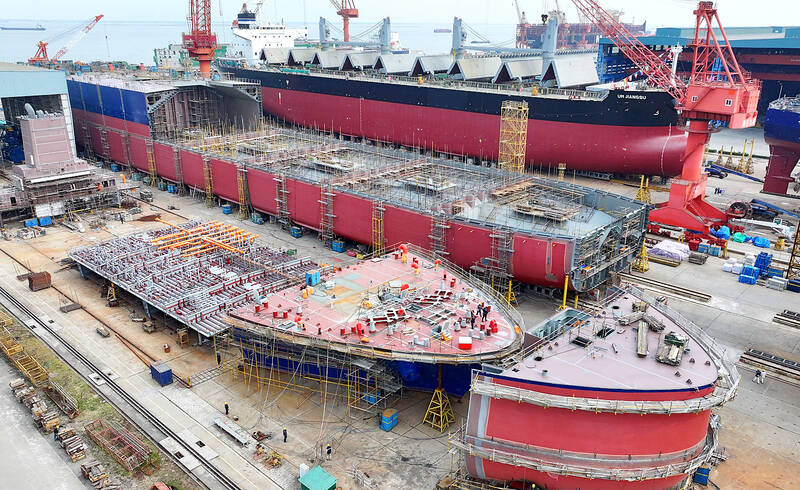The Office of the US Trade Representative on Thursday said that its probe into China’s practices in the shipbuilding, maritime and logistics sectors found that Beijing’s undermining of fair competition warranted “urgent action.”
The conclusion comes after the office launched an investigation last year, responding to a petition by five unions.
“Beijing’s targeted dominance of these sectors undermines fair, market-oriented competition, increases economic security risks and is the greatest barrier to revitalization of US industries,” US Trade Representative Katherine Tai (戴琪) said in a statement.

Photo: AFP
The findings, under Section 301 of the Trade Act, “set the stage for urgent action to invest in America and strengthen our supply chains,” Tai added.
The Chinese Ministry of Commerce hit back yesterday, saying it was “strongly dissatisfied and firmly opposes” the probe, and that its conclusions were “full of false accusations against China.”
A Section 301 investigation was a key tool US president-elect Donald Trump’s first administration used to justify tariff hikes on Chinese goods.
Tai on Thursday said that the US builds fewer than five ships each year — a sharp decline from in the 1970s — while China builds more than 1,700.
The investigation found China’s efforts to dominate the sector “unreasonable,” as they displace foreign firms and create dependencies on the world’s second-biggest economy.
The office said that Beijing also has “extraordinary control over its economic actors and these sectors.”
In its response, the Chinese ministry said that “historically, the decline of the US shipbuilding industry has had nothing to do with China.”
“China’s shipping market has always been open to the world and has never adopted discriminatory policies against foreign ships and foreign companies,” it said in a statement. “China’s industrial policy is mainly guiding rather than mandatory, and treats Chinese and foreign companies equally.”
“The US’ 301 investigation is based on domestic political needs and the aim to suppress China’s development,” the ministry said.
A decision on what actions to take would be considered in the next stage of the US probe.
Meanwhile, Alliance for American Manufacturing president Scott Paul on Thursday applauded the pursuit of the investigation.
“Failing to take decisive action will leave our shipbuilding capabilities at the mercy of Beijing’s persistent predatory market distortions,” Paul said.

Taiwan’s rapidly aging population is fueling a sharp increase in homes occupied solely by elderly people, a trend that is reshaping the nation’s housing market and social fabric, real-estate brokers said yesterday. About 850,000 residences were occupied by elderly people in the first quarter, including 655,000 that housed only one resident, the Ministry of the Interior said. The figures have nearly doubled from a decade earlier, Great Home Realty Co (大家房屋) said, as people aged 65 and older now make up 20.8 percent of the population. “The so-called silver tsunami represents more than just a demographic shift — it could fundamentally redefine the

The US government on Wednesday sanctioned more than two dozen companies in China, Turkey and the United Arab Emirates, including offshoots of a US chip firm, accusing the businesses of providing illicit support to Iran’s military or proxies. The US Department of Commerce included two subsidiaries of US-based chip distributor Arrow Electronics Inc (艾睿電子) on its so-called entity list published on the federal register for facilitating purchases by Iran’s proxies of US tech. Arrow spokesman John Hourigan said that the subsidiaries have been operating in full compliance with US export control regulations and his company is discussing with the US Bureau of

Businesses across the global semiconductor supply chain are bracing themselves for disruptions from an escalating trade war, after China imposed curbs on rare earth mineral exports and the US responded with additional tariffs and restrictions on software sales to the Asian nation. China’s restrictions, the most targeted move yet to limit supplies of rare earth materials, represent the first major attempt by Beijing to exercise long-arm jurisdiction over foreign companies to target the semiconductor industry, threatening to stall the chips powering the artificial intelligence (AI) boom. They prompted US President Donald Trump on Friday to announce that he would impose an additional

China Airlines Ltd (CAL, 中華航空) said it expects peak season effects in the fourth quarter to continue to boost demand for passenger flights and cargo services, after reporting its second-highest-ever September sales on Monday. The carrier said it posted NT$15.88 billion (US$517 million) in consolidated sales last month, trailing only September last year’s NT$16.01 billion. Last month, CAL generated NT$8.77 billion from its passenger flights and NT$5.37 billion from cargo services, it said. In the first nine months of this year, the carrier posted NT$154.93 billion in cumulative sales, up 2.62 percent from a year earlier, marking the second-highest level for the January-September